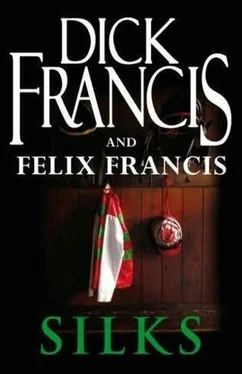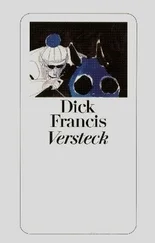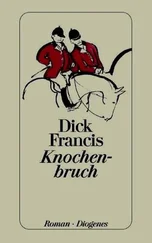‘That Mitchell stuck him one because Barlow accused him of killing his sister.’
‘And who exactly told you that?’ I asked him.
‘That’s the word in the press room,’ he said. ‘Everyone’s saying it.’
‘And is that what you think?’ I asked him.
‘Yeah,’ he said uncertainly. ‘Suppose so.’
We stood together in awkward silence for a moment before he turned away with a slight wave of a hand and went off in search of someone else.
I stood and drank in the atmosphere. Even the weather was joining in the enthusiasm. The sun peeped out from behind a fluffy white cumulus cloud to warm the hearts and souls of seventy thousand racegoers. This was Cheltenham on Gold Cup day and there was nothing quite like it.
‘Hi, Geoff.’ It was Nick Osbourne, with a smile.
‘Hello, Nick.’ We shook hands warmly. The truce from the previous day was still holding. ‘Any runners today?’ I knew he didn’t have one in the Gold Cup or the Foxhunters but, apart from those races, I had no idea what was running.
‘One in the novice hurdle,’ he said. ‘Not much chance really.’
‘Good luck anyway,’ I said.
‘Good luck to you too,’ he replied. ‘On Sandeman.’
‘Thanks.’
We stood in easy companionship for a while discussing our chances and, as always on this day, coming back to who we thought would win the big one.
By the time of the first race at two o’clock my guts were twisted tighter than those of Eleanor’s equine patient, and the nerves were beginning to get to me. I sat on the bench around the changing room and made myself calm down. Ieven managed to force down a cheese and pickle sandwich and a cup of tea that had thoughtfully been provided for the jockeys in the weighing room.
I was not alone in feeling nervous. Even for the top professionals, chances on good horses at Cheltenham were few and far between. For the jockeys of the three or four top-rated horses in the Gold Cup this was a day that could define their careers. Gold Cup winners, both horses and jockeys, were remembered and revered.
I spent much of the afternoon sitting in the changing room alone with my thoughts, mentally running the race over and over in my head, deciding where I wanted to be and when, whether to be on the inside to take the shortest route or to run further wide and give myself more room. Sandeman was fit and so was I. There would be no repeat of Sandown the previous November when it had been my fault we hadn’t won. On this day the horse and jockey would both have the stamina to come up the Cheltenham hill after three and a quarter miles.
I stood on the scales in my riding clothes holding my saddle, together with the felt pad that goes under it, the number cloth and the weightcloth, a devious contraption that sits beneath the saddle with lead sheets in pockets to add weight. The digital read-out settled on twelve stone, the required mark, and the clerk of the scales ticked me off on his list. As a rule jockeys don’t like carrying extra lead as it sits as dead weight on the horse’s back, but I was secretly quite pleased that I had eight pounds of it in my weightcloth, especially as I was using a heavier saddle than many of the other amateurs waiting for their turn on the scales. All that running and skiing had done the trick and I was lighter than I had been for quite a while. I was now well under eleven stone in my birthday suit, so carrying twelve was easy.
I had never really had much trouble doing the weight on Sandeman as he had always been fairly highly rated and, even in handicaps, he had always been near to top weight. Some jockeys, however, had an ongoing struggle every day to keep their weight down, a problem that to me seemed to be getting worse as the average size of the population grew while the racing weights stayed the same.
You could always tell when someone was in trouble doing the weight. There were little games they would play with the clerk of the scales, who was probably wise to every one. They would leave their cap on their helmet and place it on the table. The rule stated that the cap should be weighed even if the helmet wasn’t. Others would weigh-out using paper-thin boots, known by jockeys as cheating boots, which they would then change for their regular riding boots when safely back in the changing room. It had also been known for jockeys to weigh-out with a much lighter saddle than they actually intended using, or indeed, if things were desperate, with no saddle at all. Overweight was frowned upon by the stewards, and by owners and trainers alike, and could make the difference between keeping or losing the ride on that horse in the future.
Having successfully cleared the scales, I handed my saddle and the rest of the tack to Paul Newington, who was standing by waiting to receive it.
‘See you in the parade ring,’ he said, and turned on his heel.
I could tell that he was nervous as well and I watched his back as he hurried away to get Sandeman ready in the saddling boxes.
I went into the changing room to get a jacket to put over my silks and then back out onto the weighing-room terrace to watch the Gold Cup on the big screen set up near the paddock. The favourite won easily with Reno Clemens in the saddle. They had jumped clear of the chasing pack over the last two fences in the straight and stormed up the hill to win by eight lengths. They received a hero’s welcome from the huge crowd. But Steve Mitchell in his prison cell wouldn’t like it, I thought. He should have been riding that winner. He had ridden the horse all the way through its career only to miss out on its crowning glory.
With the Gold Cup over, now it was my turn. The Foxhunter Chase was less than half an hour away and the butterflies in my stomach had turned into full size eagles. I went back into the changing room and made all my last-minute adjustments once again, making sure I was wearing my back protector and that it was correctly fitted, checking that my silks were on properly with rubber bands around the wrists to stop the wind rushing up the sleeves, tying and retying the cords on my cap to get them right, to ensure it didn’t fly off my helmet during the race.
I went once again to the loo and nervously paced around. It was like waiting outside the exam room before my law finals at university, or being in a dentist’s waiting room before an extraction.
Finally, the call was made for the jockeys to go out to the parade ring. As always, I felt the burst of adrenalin course through my body but, this time, I wasn’t so sure I was enjoying it. The expectation was too great. Riding last year’s winner and this year’s favourite, as well as carrying so many punters’ hopes, was taking much of the fun out of it.
Paul and Laura stood on the grass in the paddock and both seemed to hop from foot to foot with nervousness.
‘Good luck,’ said Laura breathlessly, giving me a kiss on the cheek.
‘Look,’ I said. ‘Let’s just enjoy it. Eh?’ They both looked at me as if I were mad. ‘Win or lose, it’s been a great day out.’
I smiled at them. They didn’t smile back. Oh no, I thought, they’ve had a big bet on us to win. I could read it in their faces. Oh, woe is me. Just another load of pressure I could have done without.
Paul gave me a leg-up onto Sandeman’s back and he slapped a hand on his neck. ‘Go get ’em, cowboy,’ he said nervously in a mock American accent, looking up at me.
‘Do my best, pardner,’ I said back to him in the same manner.
We circled around the ring a couple of times as the horses sorted themselves out and then we were led out towards the course by two huntsmen in scarlet jackets.
Sandeman beneath me was eager to get going and he didn’t like being crammed in on all sides by the massive crowd five deep against the horse-walk rail.
Читать дальше












